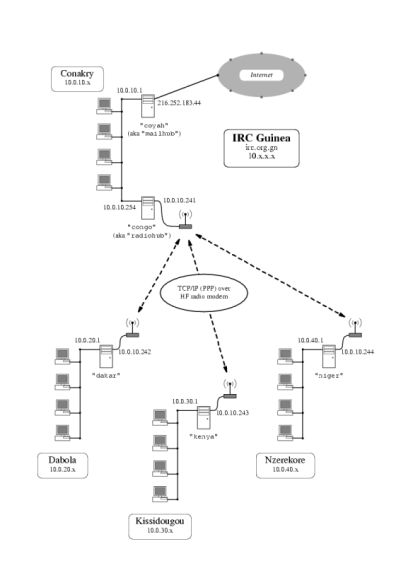| Home |
| News |
| Projects |
| Publications |
| TechNotes |
| Software |
| About |
| Contact |
Radio EmailAfter a period of research and field trials, we implemented a wide-area network for the International Rescue Committee in the Republic of Guinea, West Africa, using high-frequency (HF) radio. The system went on line in January 2002, providing global Internet email access directly to over 60 desktops in 4 offices scattered throughout the country. Three of these field offices were sited in remote locations, hundreds of kilometres of rough dirt roads from one another and the capital city, and otherwise not served by any Internet access or regular telecommunications whatsoever. Yet staff in these offices were now able to communicate at will with their colleagues, family and friends in New York, Paris, --anywhere in the world. The total recurring costs for this service? $150 (USD) per month, for the local ISP in Conakry. A detailed report of this project has been published in the November 2002 issue of Linux Journal, who have made the complete version, including diagrams and configuration files, available here.
Current Status My wife and I left Guinea in September 2002. At that time the system had proven exceptionally stable and reliable. As an example, the central email server in Conakry had a continuous uptime of over 6 months without failure. (One weekend in June 2002, a delay in switching to a backup generator resulted in a brief power loss. After restarting, the system continued to run steadily for months on end.) This compares to an average of 3 reboots per day when the organization was trying to use something called "Windows NT." As a bonus, when we replaced the incapable OS with FreeBSD on the same hardware, network throughput for Internet access was over twice as fast. People kept asking us, amazed, "What did you do? The system is so much faster now!" The only significant problem with the radio email system was related to lightning strikes during Guinea's long rainy season. The aerial antennas for the radios are simply long loops of wire strung horizontally between two poles. Hung 30 feet in the air, the arms of these antennas stretch about 60 feet wide, just begging to take a hit. During this period we had several incidents of scorched serial ports, fried network cards, and damaged ethernet hubs. All of these incidents were preventable, had the radio operators followed established procedures for disconnecting the antenna cables at night and during periods of storm activity. Subsequent disciplinary action and ongoing training have decreased these problems. In December 2002, a lighting strike damaged network cards in the firewall/gateway system of the central office in Conakry. After an exchange of emails half-way around the world, we reconfigured the system and restored service in less than 72 hours. Lessons Learned The greatest value of the project was not in demonstrating the use of HF radio as a medium for networking. In fact, we would not recommend HF radio for this purpose if other forms of connectivity are available at reasonable cost. Rather, the project demonstrates the value of adapting open source technologies to the local resources and requirements that are available. In the case of the "Radio Email" project, IRC-Guinea already had the radios and radio modems, desktop computers, and the single Internet connection in their central office. We only added a few network cards, some CAT 5 cable, and freely available, world-class, open source software, as embodied in Linux and FreeBSD systems. The result was an appropriate, sustainable, and effective solution, and one that would have otherwise not been attainable. As a result of this system, operational management was improved considerably. Especially in the area of logistics, IRC staff were able to communicate, anticipate, and problem-solve far more easily and regularly with one another, right from their own desktops. In addition, the system literally opened up the world for people. At least two of the IRC staff--a man from Kissidougou and a woman from Dabola--are now attending school abroad thanks to the ability to communicate and transmit information freely over the Internet. These are the opportunities and lessons learned from using "Radio Email." Update, Feb 2004 My wife got an email from Nzerekore the other day. Nzerekore! Look for it on the map sometime. I checked the headers. Sure enough, there it was: Nzerekore! Proving the Radio Email system is still working well, each and every day, 2 years on. Please see our documentation project, the djb way, for current technical information regarding email for bandwidth-challenged applications (such as "qmail unplugged".) |
||
|
Copyright © 2002 - 2005, Wayne Marshall. All rights reserved. Last edit 2005.03.07, wcm. |
